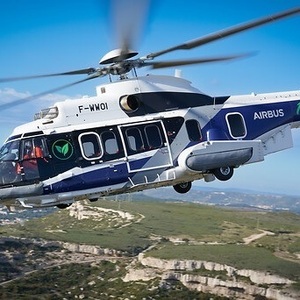First Airbus helicopter flight with 100% SAF

SOURCE: Airbus
November 16, 2021
BY Airbus
An Airbus H225 has performed the first ever helicopter flight with 100 percent sustainable aviation fuel (SAF) powering one of the Safran Makila 2 engines. The flight, which took place at the company’s headquarters in Marignane, marks the start of a flight campaign aiming to assess the impact of unblended SAF on the helicopter systems in view of certifying the use of SAF blends that exceed today’s 50 percent limit.
“While all Airbus helicopters are certified to fly with up to a 50 percent blend of SAF mixed with kerosene, it is our company’s ambition to have its helicopters certified to fly with 100 percent SAF within the decade. Today’s flight is an important first step towards this goal,” said Stefan Thome, executive vice president, engineering and chief technical officer, Airbus Helicopters.
Advertisement
The flight campaign, which follows earlier unblended SAF bench tests performed by Safran Helicopter Engines at its Bordes plant, will provide further understanding of the technical challenges associated with the use of 100 percent SAF. The H225 test helicopter flew with an unblended SAF derived from used cooking oil, provided by TotalEnergies, which offers a net 90 percent CO2 reduction compared to regular jet fuel.
“SAF is an important pillar of Airbus Helicopters’ decarbonization strategy because it provides immediate CO2 reduction with no negative impact on the performance of the helicopter,” Thome added. “I thank our partners Safran Helicopter Engines and TotalEnergies for their important collaboration in making today’s flight a reality. Further cooperation among all industry stakeholders is essential to overcome the challenges associated with implementing SAF widely and to make real progress in reducing the aviation industry’s CO2 emissions”.
Advertisement
In order to drive the deployment of biofuels, Airbus Helicopters has launched a SAF User Group dedicated to the rotary-wing community. The company has also started using SAF for training and test flights at its French and German sites.
Related Stories
The U.S. Energy Information Administration maintained its forecast for 2025 and 2026 biodiesel, renewable diesel and sustainable aviation fuel (SAF) production in its latest Short-Term Energy Outlook, released July 8.
XCF Global Inc. on July 10 shared its strategic plan to invest close to $1 billion in developing a network of SAF production facilities, expanding its U.S. footprint, and advancing its international growth strategy.
U.S. fuel ethanol capacity fell slightly in April, while biodiesel and renewable diesel capacity held steady, according to data released by the U.S. EIA on June 30. Feedstock consumption was down when compared to the previous month.
XCF Global Inc. on July 8 provided a production update on its flagship New Rise Reno facility, underscoring that the plant has successfully produced SAF, renewable diesel, and renewable naphtha during its initial ramp-up.
The USDA’s Risk Management Agency is implementing multiple changes to the Camelina pilot insurance program for the 2026 and succeeding crop years. The changes will expand coverage options and provide greater flexibility for producers.
Upcoming Events










